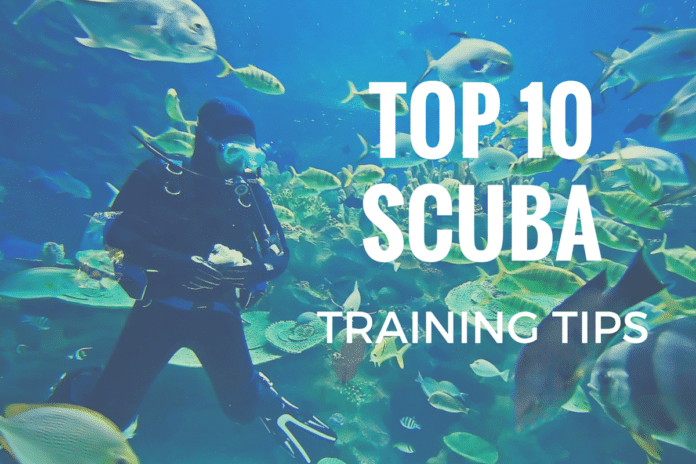SCUBA Divers never stop learning. Whether they are beginners or have been diving for 40 years, the ability to expand their knowledge never stops. Here are the Top 10 SCUBA Training Tips which can help you improve your skill set meaning that you can have more fun and enjoy your time below the surface.
Here Are The Top 10 SCUBA Training Tips
- Keep A Log
When you are a beginner, keeping a log is everything. However, as you become an advanced SCUBA diver, keeping a log can seem time consuming and downright boring. Keeping a log is not only a record of your incredible experiences, it can also provide information that is invaluable when planning your next dive. This information can include; air consumption, what scuba gear best suits you, what weights you use and which parts of your equipment requires servicing. Being able to reminisce is also a great reason to keep a log, to discuss your experiences with family, friends and other like-minded SCUBA divers. - Issues with Buoyancy?
Are you struggling to get down but your weighting is correct? Well, do not panic. Focus your eyes downwards, take a deep breath and breathe out slowly, focus your attention on feeling heavier and heavier as the air leaves your lungs. Whilst you are doing this exercise you won’t even realize that you are 5m deep and counting. This always works for me if I’m feeling a little ‘light’ during a dive. - Learn To Make Good Decisions
If you are not going to enjoy the dive, why do it? Feeling comfortable is essential when diving. You want to be able to get the best experience possible from your dive and that is not going to happen if you’re uncomfortable. - Take it Slow
Always slow down. The majority of SCUBA divers race through their dives like a freight train. To the majority of marine life, SCUBA divers are a loud group of scary creatures that sweep through their habitat. When you take it slow, the more marine life come out. If you relax and take it slow, then you are more likely to see some incredible things. As well as this, you will also be able to consume your air supply at a much slower rate, keeping you at a deeper level for longer. - Weights
Weights play an essential part of your dive. Weights can affect your air consumption, the way you tread on the underwater environment (lightly of course) and whether you relax throughout your dive. If you are incorrectly weighted, then this can affect everything. Keeping an up-to-date log can help you prevent having any issues on your next dive. Remember, that there are many extraneous circumstances that can change your buoyancy, these include; wetsuit thickness, saltwater dives, fresh water dives and the different tank sizes that are available. Keeping a log of every dive can help to prevent any issues with your buoyancy, even if you do not dive for a few years, you will always be able to look back and prevent an issue with your buoyancy. - Check If You Are Weighted Correctly
To check if you are weighted correctly, once you are in the water, lean back and empty your BCD completely by holding up your inflator hose as far as it will stretch, pressing the deflate button. Take in a normal breathe and hold. Once your BCD has totally deflated, you should remain at eye-level on the surface. If you sink below eye-level whilst holding your breathe, then you are wearing too many weights. - Test Your Pressure Gauge
Many SCUBA divers check their pressure gauges and jump into the water without thinking. Never be fooled by a ‘full-tank’ reading. Once you have all of your gear on, take 4 deep breaths from your regulator. Watching your pressure gauge, if the needle is stationary at the full position, then your air is on and you are ready to go. However, if the needle of your pressure gauge drops to zero and then bounces back up then your air is not completely on. Finally, if the needle drops and then drops further, your air was on but is not on now, so get it checked. - Mark What Belongs To You
Always take a waterproof pen with you’re on a dive boat to mark what drinks you have in the cooler. There is nothing worse than getting back from a dive, totally parched and finding that someone has finished your water. - Having Trouble Equalizing?
If you can’t equalize you will not be able to get below the surface and join the dive, so if you have tried every trick in the book and still can’t find a winner, then stay at the surface for a moment by inflating your BCD and remove your mask. Using one hand, scoop up some sea water and without fear, sniff it as hard and fast as you can. This should clear your nose and sinus passages meaning that you should be able to equalize and join the rest of your dive. - Always Plan Your Dive
Never rely on your dive instructor, dive master or your computer. Always check out the dive sites on maps or plastic tables to ensure a safe and enjoyable dive.
Have you got any other tips you want to share? Let us know in the comments below.

